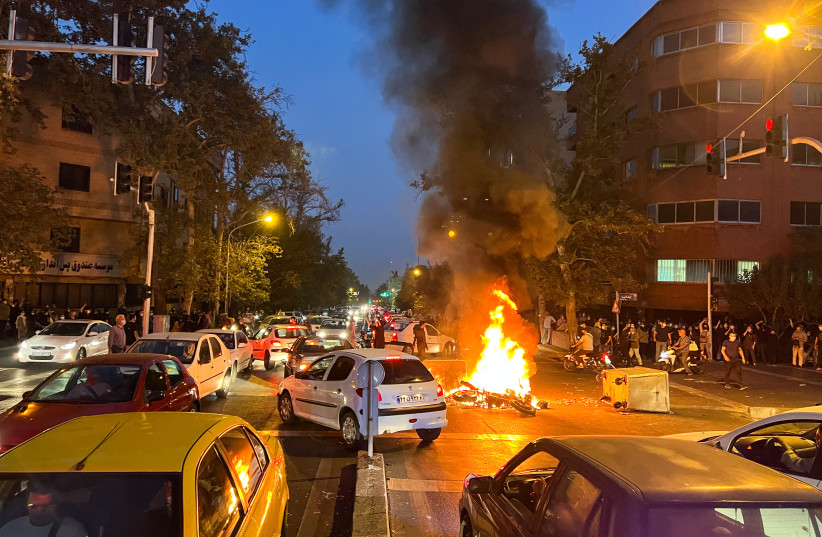The Israeli graffiti artist, Benzi Brofman, who lives in Migdal Ha’emek, is a Jew who immigrated to Israel from the United States. His murals are in demand in many places around the world, including in the centers of European capitals. In collaboration with the Iranian-American filmmaker and entrepreneur, Hooman Khalili, who came to Israel especially from San Francisco to carry out the project, Benzi created a spectacular mural under the title Freedom, Life, Woman.
The painting is intended to express support for the protesters in Iran, in general, and Iranian women, in particular. It is interesting that Israel is the only country in the entire Middle East, where local communities have given public recognition to the Iranian women who are struggling against the Ayatollah regime.
Following the success of the first mural, which Khalili produced about a month ago in the Talpiot industrial area in Jerusalem, the second mural was painted on an enormous concrete wall in Nazareth, the largest Arab city in Israel. The project received the blessing of Mayor Ali Salam while the property owners, Adham and Bilal Kananaba, gave consent to use a wall of their complex without payment. All this, with the understanding that it is an exercise in humanity.
Support for Iranian women spans across Israel's religious, ethnic, cultural divides
However, this is not a trivial step in a country where an apprehensive atmosphere prevails between Arabs and Jews, all the more so in light of the fact that elections for the local authorities are expected to take place in October this year, with palpable tension already in the air.
Nazareth is indeed the “Arab City of Lights” and is viewed as relatively liberal in the region. Moreover, all the Muslims who live in Nazareth are Sunnis, although several conservative political groups also live and work there, including those who have no particular interest in upsetting the Alawite and Shi’ite regimes in Syria or Iran.

“This mural in a city like Nazareth symbolizes that support for the Iranian people in Israel extends across religious, cultural and class divides.”
Emily Schrader
“This mural in a city like Nazareth symbolizes that support for the Iranian people in Israel extends across religious, cultural and class divides,” said Emily Schrader, a journalist and social activist, who, among other things, also initiated and led the rally in Tel Aviv in support of the citizens of Iran last month.
This mural shows the faces of Iranians who have been murdered by the Islamic regime.
“They remind us of the overwhelming injustice that the citizens of Iran face every minute of every day,” said the entrepreneur Khalili, who himself fled Iran as a youngster, found shelter in a church in San Francisco and grew up as a Christian American. Khalili seeks to strengthen his identity and belonging to the Iranian people by increasing awareness of the perpetual suffering of the common people, especially women, and to express his solidarity through creating murals collaborating with local artists.
BROFMAN, who also painted a mural in London two months ago expressing support for the Iranian people, received Khalili’s appeal through the Israeli Foreign Ministry. “As someone who grew up in Migdal Ha’emek, a stone’s throw from Nazareth, I knew that painting this new mural was a huge task and a mission for me,” Benzi told me. Together with Khalili, they scoured the streets of Nazareth seeking out local property owners who would agree to “donate” a wall on some building for the benefit of the mission of honoring Iranian women.
The mural depicts the symbol of the lion and the sun, which dates back to 12th century Persia, and also appeared in the center of the Iranian flag before the 1979 Islamic Revolution. The mural also shows a woman holding a sword and riding a lion, as a sign that Iranian women are actually the leaders and at the forefront of the current revolution in Iran.
The painting contains an empowering message to women globally, asking them not to be afraid to stand up for themselves and lead. These are called “all the Esthers in the world,” alluding to the figure of Jewish Queen Esther who, according to the Scroll of Esther, led her people to freedom from the bitter fate planned for them by the evil Haman.
The modest ceremony took place last week under the open sky. During the entire ceremony, it almost appeared as if a heavenly gesture was made and a pause in the pouring rain came about. The sun chose to shine upon a somewhat odd occurrence: a Christian entrepreneur and a Jewish artist who joined hands to embrace and enhance the quest for all women but, in particular, the Muslim women of Iran.
Thus, it so happened that at the end of a bloody weekend, during which innocent Jewish lives were taken by murderous terrorist in Jerusalem; during a tumultuous period in Israeli internal politics in which society is torn between opinions and stances; while women are unusually few in the current Israeli government; and while, too often, one hears troubling comments from certain ministers about the role of women these days, a small initiative that was born out of a big dream took place. It creates light within the darkness and an alternative reality for women throughout the world even if the path forward is still long.
The writer, a former MK, was the founder and co-chair of the first Abraham Accords Caucus in the Knesset.
